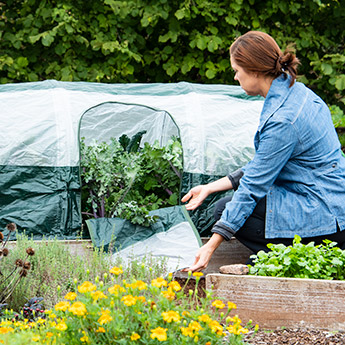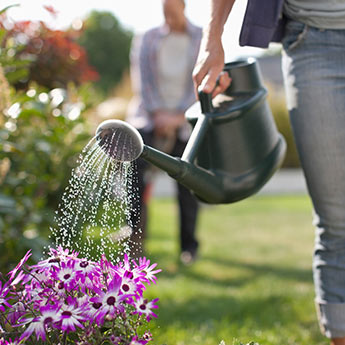Gardening Without Sight
-
Helpful Products from Gardens Alive!
-
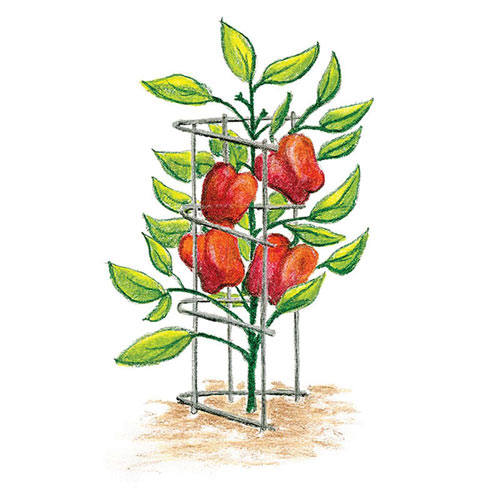 Pepper and Eggplant Support - Plant Trellis
Pepper and Eggplant Support - Plant Trellis -
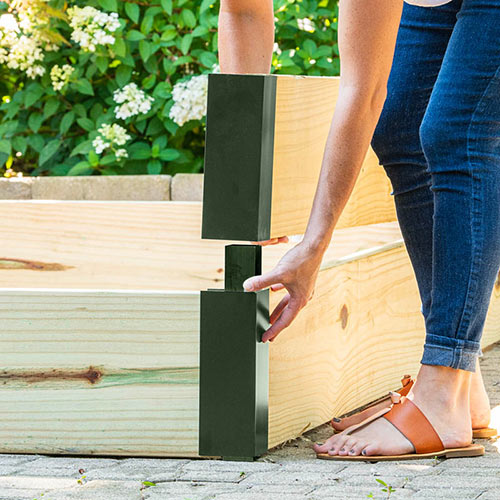 Raised Garden Bed Corners & Extenders
Raised Garden Bed Corners & Extenders -
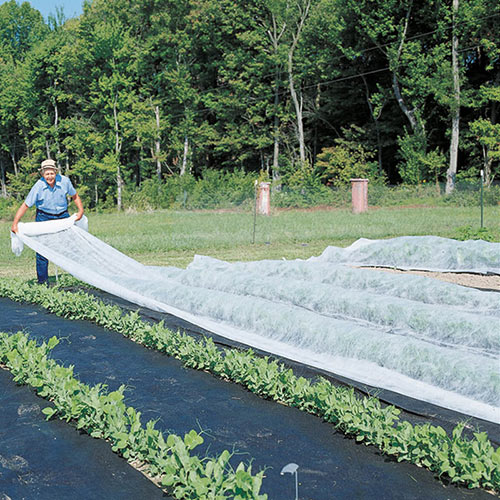 Floating Garden Row Cover
Floating Garden Row Cover -
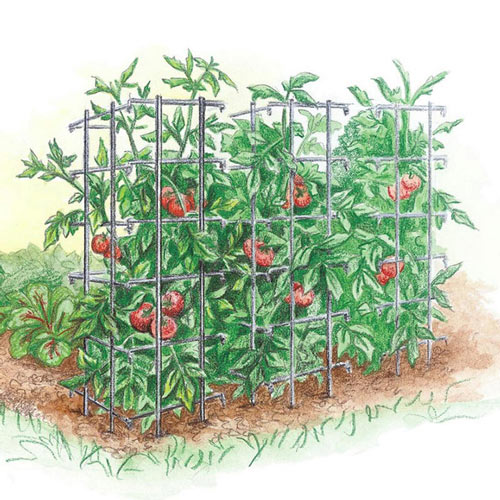 Tomato Cage - Plant Trellis
Tomato Cage - Plant Trellis
Q. John in Ocean Pines Maryland—on the famed Eastern shore—did not write in, but instead left this phone message on our radio show's call-in line (888-346-9499): "I'd like to hear Mike talk about handicapped gardeners. I went completely blind several years ago and I'd love a segment on this topic."
A. John's message took me back to my days as Editor of ORGANIC GARDENING magazine, when we received a curious tape cassette in the mail in late '92; just my name and the magazine's address written on a little manila envelope that had no postage stamp, just the words "matter for the handicapped." I played it while I strung the lights on that year's Christmas tree and listened to the NPR-level voice of Joseph Trappa explain how he and his wife Norene of Idaho Falls gardened without sight.
Previously, I had thought of gardening for the visually-impaired as well-defined pathways leading to plants with interesting textures and scents, like fragrant herbs…
But re-reading Joseph's missive—which we transcribed for the Letters section of the April '93 issue of "OG"—reminds me that the so-called impaired and challenged are often determined to rise higher than common perception. Instead of fragrance and texture, Joseph talked about growing sweet corn and tomatoes—in Idaho, which has a very challenging climate, not unlike the Southwest Colorado gardens we discussed last week.
And other people didn't create or tend this garden for him. In fact, his style is the opposite of passive. Here's part of his transcribed message, which originally ran in the April '93 issue of ORGANIC GARDENING.
Joseph writes: "My wife and I are both blind. We love growing tomatoes and sweet corn and are constantly looking for the best varieties for our short-season location. We have dabbled in organic gardening—vegetable gardening, not flowers—for many years. And every year the gardens get better, thanks to you and your magazine.
"You're probably wondering how in the world we manage to garden. Well, it's not all that difficult. A blind person or a person with other disabilities can accomplish anything if they just sit down and give proper thought to it.
"First, we chose the size of our plot and fenced it in with chicken wire and metal posts. The fence defines the boundaries of the garden. Then I made a wooden pathway smack down the center and to the left and right of the pathway I have my rows. I cut 30-inch-high wooden stakes on my table saw and put one at the end of each row. The stakes have Braille plastic markers on them describing what's in each row.
"However, I have a tendency to overplant, and the garden becomes so entangled—especially with tomatoes—that you can hardly walk through it. So we have decided to go to raised bed gardening for everything except our sweet corn. I hope to have six raised beds ready this Spring. They'll be easier to put a cover over if frost is in the forecast.
"Raised beds are also a heck of a lot better for people like us because you stub your toe on them when you 'find' one, and then you're less likely to walk into your vegetables and crush a beautiful tomato.
"We can tell when our food is ripe by feel. And I'd say we're right about 80 percent of the time. When a tomato is genuinely red, you can tell by the tenderness of that tomato. If it's still a little bit firm, give it a day and it'll get nice and soft. The same with sweet corn; pull back the silk, taste the top couple of kernels and you'll know how much longer it might take. With peppers, squash and melons you can tell by their size and the length of time they've been growing."
Q. Two years later, in 1995, the magazine heard from Kate Chamberlin in Walworth, New York, who explained that she went blind at the age of 40, and "sat around feeling unhappy for the next five years." Then she pulled herself together and—with the help of her sighted husband—got back into the garden.
Kate wrote: "I'm told that my once-neglected garden is beautiful again, but I 'see' it in a very different way now. Feeling the difference between soft pine bark, solid boards and hard brick paths lets me know what section of the garden I'm in. I sit on my son's skateboard and roll along the boards to weed, prune and harvest. My fingers have learned to distinguish the firm but not hard flesh of ripe strawberries.
"I now realize that my gardening days are far from over! The tall apricot iris reaches up to share its heady fragrance with me, and I rub the tiny leaves of the lemon thyme to marvel in its citrus aroma. It's a very different way of gardening than I was used to, but not impossible. Once a gardener, always a gardener!"
A. John's message took me back to my days as Editor of ORGANIC GARDENING magazine, when we received a curious tape cassette in the mail in late '92; just my name and the magazine's address written on a little manila envelope that had no postage stamp, just the words "matter for the handicapped." I played it while I strung the lights on that year's Christmas tree and listened to the NPR-level voice of Joseph Trappa explain how he and his wife Norene of Idaho Falls gardened without sight.
Previously, I had thought of gardening for the visually-impaired as well-defined pathways leading to plants with interesting textures and scents, like fragrant herbs…
But re-reading Joseph's missive—which we transcribed for the Letters section of the April '93 issue of "OG"—reminds me that the so-called impaired and challenged are often determined to rise higher than common perception. Instead of fragrance and texture, Joseph talked about growing sweet corn and tomatoes—in Idaho, which has a very challenging climate, not unlike the Southwest Colorado gardens we discussed last week.
And other people didn't create or tend this garden for him. In fact, his style is the opposite of passive. Here's part of his transcribed message, which originally ran in the April '93 issue of ORGANIC GARDENING.
Joseph writes: "My wife and I are both blind. We love growing tomatoes and sweet corn and are constantly looking for the best varieties for our short-season location. We have dabbled in organic gardening—vegetable gardening, not flowers—for many years. And every year the gardens get better, thanks to you and your magazine.
"You're probably wondering how in the world we manage to garden. Well, it's not all that difficult. A blind person or a person with other disabilities can accomplish anything if they just sit down and give proper thought to it.
"First, we chose the size of our plot and fenced it in with chicken wire and metal posts. The fence defines the boundaries of the garden. Then I made a wooden pathway smack down the center and to the left and right of the pathway I have my rows. I cut 30-inch-high wooden stakes on my table saw and put one at the end of each row. The stakes have Braille plastic markers on them describing what's in each row.
"However, I have a tendency to overplant, and the garden becomes so entangled—especially with tomatoes—that you can hardly walk through it. So we have decided to go to raised bed gardening for everything except our sweet corn. I hope to have six raised beds ready this Spring. They'll be easier to put a cover over if frost is in the forecast.
"Raised beds are also a heck of a lot better for people like us because you stub your toe on them when you 'find' one, and then you're less likely to walk into your vegetables and crush a beautiful tomato.
"We can tell when our food is ripe by feel. And I'd say we're right about 80 percent of the time. When a tomato is genuinely red, you can tell by the tenderness of that tomato. If it's still a little bit firm, give it a day and it'll get nice and soft. The same with sweet corn; pull back the silk, taste the top couple of kernels and you'll know how much longer it might take. With peppers, squash and melons you can tell by their size and the length of time they've been growing."
Q. Two years later, in 1995, the magazine heard from Kate Chamberlin in Walworth, New York, who explained that she went blind at the age of 40, and "sat around feeling unhappy for the next five years." Then she pulled herself together and—with the help of her sighted husband—got back into the garden.
Kate wrote: "I'm told that my once-neglected garden is beautiful again, but I 'see' it in a very different way now. Feeling the difference between soft pine bark, solid boards and hard brick paths lets me know what section of the garden I'm in. I sit on my son's skateboard and roll along the boards to weed, prune and harvest. My fingers have learned to distinguish the firm but not hard flesh of ripe strawberries.
"I now realize that my gardening days are far from over! The tall apricot iris reaches up to share its heady fragrance with me, and I rub the tiny leaves of the lemon thyme to marvel in its citrus aroma. It's a very different way of gardening than I was used to, but not impossible. Once a gardener, always a gardener!"
-
Helpful Products from Gardens Alive!
-
 Pepper and Eggplant Support - Plant Trellis
Pepper and Eggplant Support - Plant Trellis -
 Raised Garden Bed Corners & Extenders
Raised Garden Bed Corners & Extenders -
 Floating Garden Row Cover
Floating Garden Row Cover -
 Tomato Cage - Plant Trellis
Tomato Cage - Plant Trellis
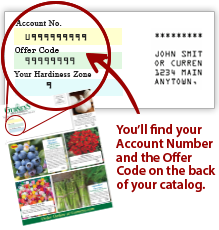




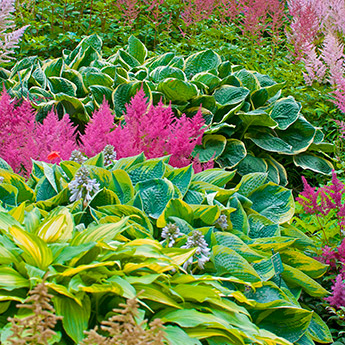
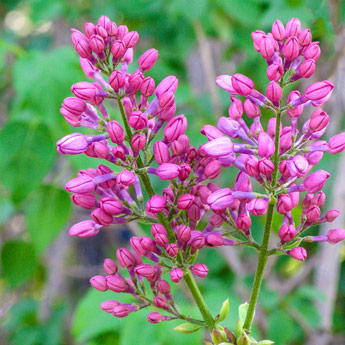
 Gardens Alive! & Supplies
Gardens Alive! & Supplies